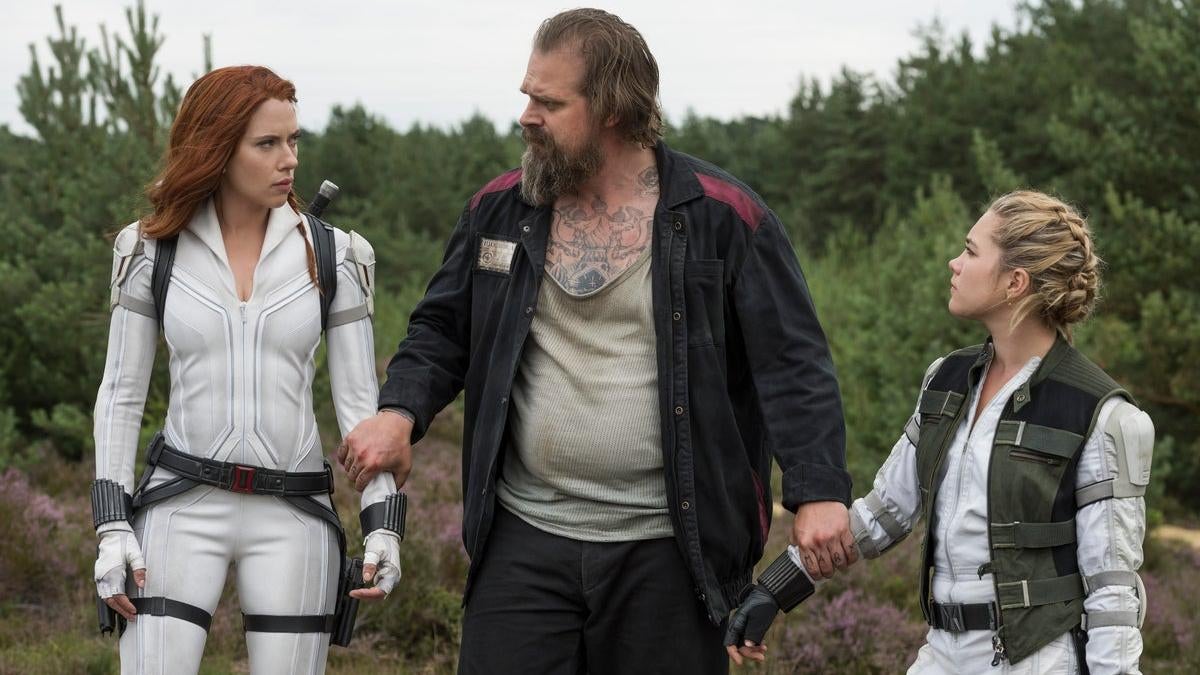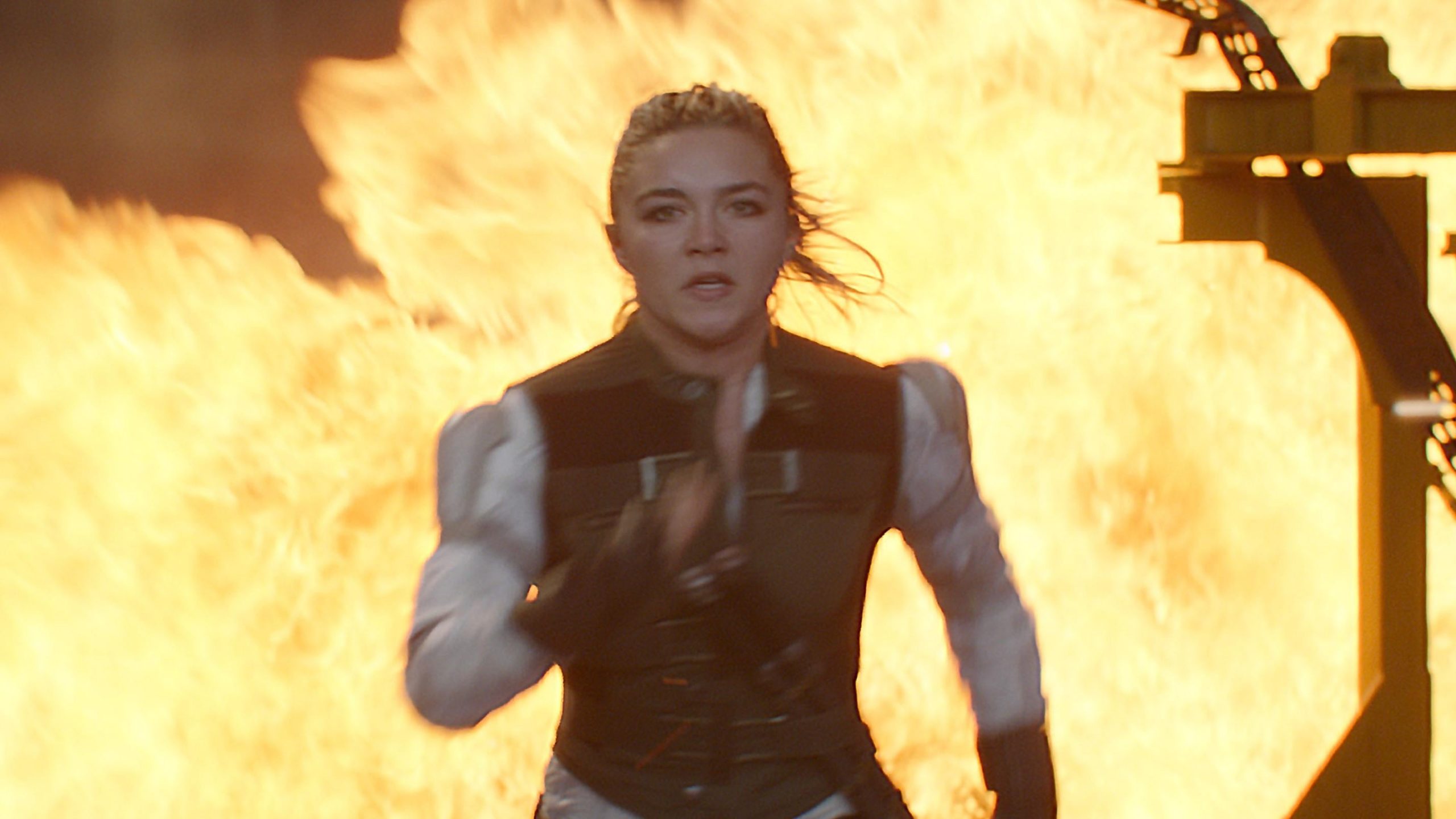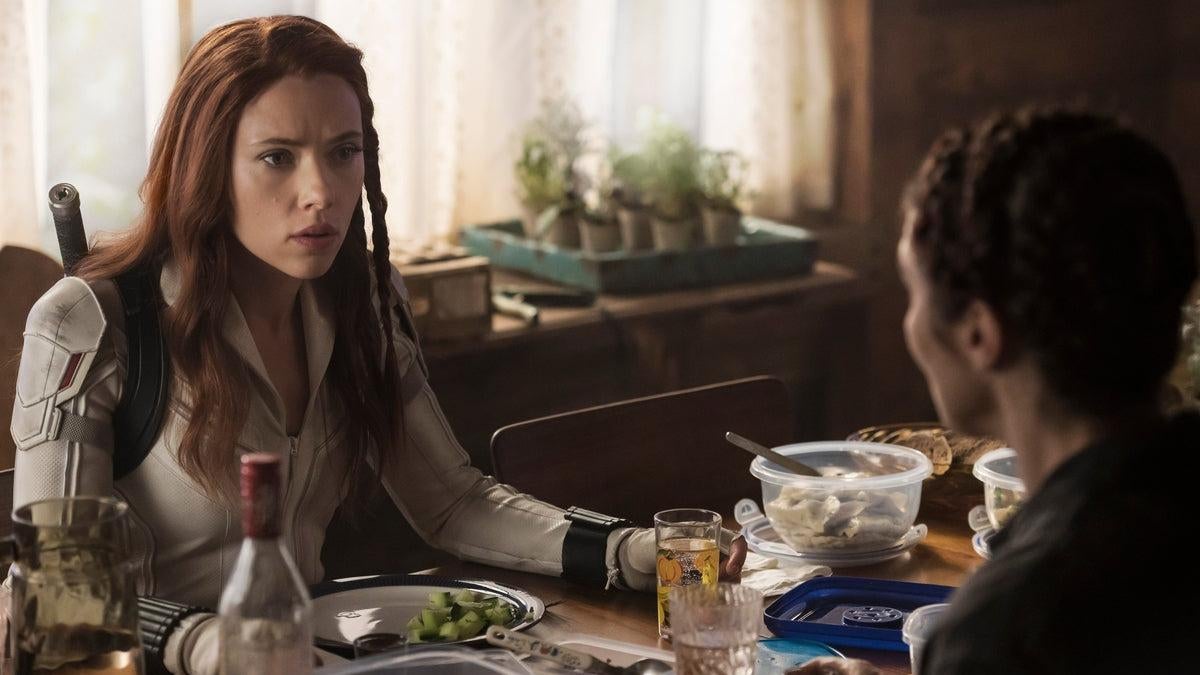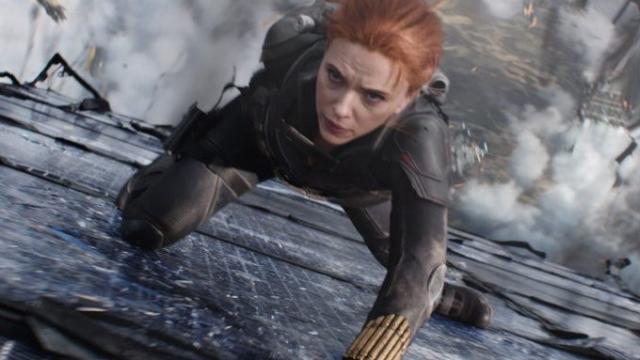On the surface, Cate Shortland’s Black Widow may feel like an inconsequential piece of the Marvel puzzle. Since it’s set between the events in Captain America: Civil War and Avengers: Infinity War, it’s easy to wonder why the studio went backward instead of forward. There’s a delicate balance there, to be sure, but the film explores the recent past with an eye on enriching many of the things we already loved about the titular character while introducing a whole new side of her world. Thankfully, it works, though it’s not without some setbacks.
In past Marvel Cinematic Universe films, we’ve seen bits and pieces of how a young woman named Natasha (Scarlett Johansson) became the high-powered assassin known as Black Widow. Teases of her past — including her parentage, and some pivotal time in Budapest — have been placed, but the truth is she’s the Avenger with the least amount of backstory.
That ends with Black Widow, directed by Cate Shortland from a script by Eric Pearson. The film explains where Natasha came from and how she became the person fans have come to love, and adds new layers that make what happens in subsequent Marvel films (mainly Natasha’s death in Avengers: Endgame) that much more poignant. And yet, because we know what happens to Natasha down the road, you end up being more interested in everything happening around her, which is a disappointment considering how long it took for the film to happen.

Black Widow introduces us to a few important people in Natasha’s life, specifically parental figures Alexi (Stranger Things’ David Harbour) and Melina (The Mummy’s Rachel Weisz), and a sister named Yelena (Midsommar’s Florence Pugh). We see them decades prior to the film’s timeline, then fast forward to when Natasha was on the run after she (and others) decided to ignore the Sokovia Accords. Eventually, she and Yelena reunite and form a shaky alliance to finish a job Natasha thought she completed a long, long time ago. Since the titular character never mentioned her sister before, you can only imagine how the other might feel about being put on the back burner for the Avengers.
That palpable tension between Yelena and Natasha is the driving force of the movie and is used to power some great action set pieces and, most surprisingly, a lot of humour. Yelena clowns on Natasha constantly, making for some of the best bits in the movie. She’s the total opposite of the Natasha we know — cold, calculating, precise — and comes across as funny, goofy, and self-aware. That doesn’t mean she isn’t deadly, far from it, but the two play off each other in some very entertaining ways. It also helps that Pugh is completely in the pocket with her performance here, exuding huge “If you didn’t know me before, you will after this” energy. She steals the movie.
The plot soon forces the sisters to reunite with Alexi and Melina and the things we learned of their early years together weigh heavily on all of them. After a few massive action scenes (four words: prison break helicopter avalanche), Black Widow slows down considerably to not just fill in blanks in the film’s narrative, but the MCU as a whole.
The best part of this though is that the reveals are never too cumbersome or invasive. There’s never a big, shocking, “Ah-ha!” moment, it’s just information that’s sprinkled in that informs everything around it. Credit this in large part to Shortland, whose obvious adoration for the characters lets those things live underneath an occasional intimacy we aren’t used to in the MCU, thanks to performance choices and cast chemistry.
However, what quickly becomes evident is because we’ve seen Natasha in so many other movies, and know she survives this one to go onto the Avengers films, her story isn’t all that interesting. Sure it’s cool to learn more about her, but a lot of that feels too familiar. Thankfully Melina, and especially Alexi and Yelena, are total blank pages to the audience, and anytime any of them are in a scene, Black Widow is at its best.

Pugh certainly reigns supreme over everyone else in the film but Harbour is a close second. If you’ve seen the trailers you know that Alexei isn’t just some regular guy — he was the Red Guardian, a Russian superhero. His personal conflict and torment, having been one before people like Captain America, Iron Man and Thor were cool, is both heartbreaking and hilarious. Harbour goes all out with the performance, which at times can feel excessive, but is mostly just endearing. Rachel Weisz fans won’t be as happy with Melina, just because she’s got the smallest role of the three and the least to work with in terms of emotion and character. But she’s still good in the role and a joy to watch, especially opposite Harbour.
It’s important to remember though, the movie isn’t called “Yelena” or “The Red Guardian.” It’s called Black Widow. And while Natasha’s growth throughout is important, it’s limited. You almost get the sense that if this was the first time Johansson had played the role, maybe she would have made other decisions. Instead, she’s locked into this persona and character after a decade-plus of playing in this universe and doesn’t have a lot of wiggle room. That holds the film back a bit because even when Natasha makes amends or learns a crucial new piece of information, she’s still the same old Natasha.
If you’re wondering who the Black Widow is actually fighting against in her film, that would be Taskmaster (played by an actor I won’t reveal for sake of spoilers). The villain is almost a Terminator-like presence throughout the film, with the singular aim of acquiring something Natasha and Yelena have in their possession. And while a reveal later in the film does add something to the character, and the action scenes featuring them are impressive, Taskmaster is never as important as one would expect. Which, when you think about Marvel’s Rogues Gallery — Loki, Thanos, Killmonger, Red Skull — is a rather large knock against Black Widow. Thankfully, there’s a lot more to the villainous subplot in the film, which does balance that out a bit.

So what you’re left with is a movie where the main hero and main villain are basically the most boring parts of the story. Admittedly, it’s not a good look. But if you think about Black Widow and Taskmaster being almost supporting cogs in the story, the other things about Black Widow come together really well. It features great new characters boosted by stellar performances, the action is on par with what you’d expect from a Marvel movie, and there are enough surprises, revelations, and cliffhangers to get you excited to see where things go next. Plus, if you were to watch the films in sequence, there’s little doubt Natasha’s actions — especially in Endgame — will be exponentially more powerful after seeing what she experiences here.
When history looks back at Black Widow, odds are most people will forget just how long it took the only woman Avenger to get her own film — and that it only came after she died. It might also be seen as a superfluous extension of Avengers: Endgame and an elaborate setup for future Disney projects, but considering it’s still very much a part of the sweeping MCU, those end up being good things. Black Widow serves multiple purposes and impacts stories going forward and backward; very few of the other Marvel movies do that or add as much colour to the overall story as this does. You’ll still wish Natasha would have evolved a bit more or that she went up again an imposing, formidable villain, but nevertheless, the film’s direction and performances give it a solid foundation and entertainment value that make it a flawed, by worthy, entry into not just the MCU, but the cinematic universe at large.
Black Widow opens in theatres on July 8 — and on Disney+ for an extra charge — on July 9.
